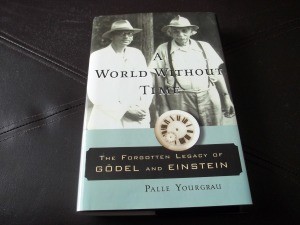When the name Albert Einstein is mentioned, there is name recognition and perhaps, from high school physics E=mc2 flashes before our eyes. Albert Einstein is as common as the days of the week.
When the name Kurt Gödel is mentioned, most people would have a difficult time placing him. Not only was Gödel the greatest logician of recent centuries, he was Einstein’s closest friend at Princeton’s Institute for Advanced Studies.
Professor Palle Yourgrau’s A WORLD WITHOUT TIME: The Forgotten Legacy of Godel and Einstein explores this friendship. In their discussions and arguments the two men tossed about a wide range of subjects -mathematics, physics, logic, philosophy, religion, time travel, theory of relativity, etc. This is what this book of 210 pages offers the reader.
Gödel is known in scientific circles for his incompleteness theorem which dealt with mathematics. There is no simple explanation of his theorem.
On a very human level, he found Walt Disney animation films fascinating. Of course, Einstein had no interest in such trivial things.
On the issue of religion, Einstein was born a Jew, but would embrace the philosophy of Benedict De Spinoza, the 17th century philosopher. Gödel was born a Lutheran and embraced the philosophy of Gottfried Wilhelm Leibniz, another 17th century philosopher who was the direct opposite of Spinoza. The one philosopher which Einstein and Gödel both embraced was Emmanuel Kant who influenced both men in their discourses and writings.
When it came down to American politics, these two Europeans shared a different world view. Einstein was a supporter of Adlai Stevenson and Gödel supported Dwight Eisenhower. Einstein felt that his friend had lost touch with reality. Einstein did not think a military general should be president of a republic.
Overall, colleagues at Princeton did not understand the friendship of Einstein and Gödel since they were so different. Yourgrau explores these differences and the ensuing bond which bridged ideological gaps to form a friendship which benefited both men and the world.
Gödel’s concept of time is explored in these pages. For Gödel time is a reality which had no relevance.
Time was curves, closed loops, where the past, present and future all existed together. If the past is still a part of present reality, then the passing of days, months and years fade into these time curves.
Based on this time theory, Gödel and Einstein are still taking their walks and bouncing off each other their ideological frames of reality. Their discourses are still boisterous as the overflowing beer steins at the local German beer hall. The fellows at Princeton are still scratching their heads at these two European gentlemen displaced by the rise of Nazism.
Of course in Gödel’s time reality, Nazism is still plotting its plan for globe dominance on the Third Reich wall graph, but unknown to them, their plan will never see fruition. For even their thousand years has no relevance to past, present and future in Gödel’s world.
This is a well written book. Without some scientific background the reader may find some passages incomprehensible, but overall it is a fascinating tale of two men who happened to be two of the greatest thinkers of the 20th century as well as being best friends. Regardless of this scientific talk and other small faults, WORLD WITHOUT TIME is definitely worth the curious reader’s time.
Perhaps, a world without time is a reality within our grasp. For us whose journey on the road of life will cease in a short span of human years, it is a philosophical concept worth contemplating.
The past, the present and the future coalesce into our eventual reality. Waiting to catch a ride on a star is the beginning of a cosmic journey.
G. D. Williams © 2014
POST 544
Adapted from my Amazon Review of the book on March 5, 2009
Photo by G. D. Williams
Additional Materials:
Palle Yourgrau
http://www.brandeis.edu/facultyguide/person.html?emplid=4e52d66a63e58568c57a1a6b41f957eab4a2badb


You must be logged in to post a comment.